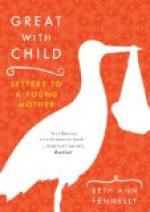Were Locke still living, I should like to interrogate him at this place. He first speaks of giving children no meat till they are two or three years old; and then afterwards extends the period to three or four. The question I would put is this: If the child is healthier without meat till he is three or four years old, why not till he is thirteen or fourteen; or even till thirty, or forty, or seventy? And is not Professor Stuart, of Andover—a meat eater himself, and an advocate for its moderate use by those who have already been trained to the use of it—is not the Professor, I say, more than half right when he asserts, as I have heard him, that it may be well to train all children, from the first, to the exclusive use of vegetable food?
I have a few more extracts from Locke, particularly on the subject of bread.
“I should think that a good piece of well made and well baked brown bread would be often the best breakfast for my young master. I am sure it is as wholesome, and will make him as strong a man, as greater delicacies; and if he be used to it, it will be as pleasant to him.
“If he, at any time, call for victuals between meals, use him to nothing but dry bread. If he be hungry more than wanton, bread will go down; and if he be not hungry, it is not fit that he should eat. By this you will obtain two good effects. First, that by custom he will come to be in love with bread; for, as I said, our palates and stomachs, too, are pleased with the things we are used to. Another good you will gain hereby is, that you will not teach him to eat more nor oftener than nature requires.
“I do not think that all people’s appetites are alike; some have naturally stronger and some weaker stomachs. But this I think, that many are made gormands and gluttons by custom, that were not so by nature. And I see, in some countries, men as lusty and strong, that eat but two meals a day, as those that have set their stomachs, by a constant usage, to call on them for four or five.
“The Romans usually fasted till supper, the only set meal, even of those who ate more than once in a day; and those who used breakfasts, as some did at eight, same at ten, others at twelve of the clock, and some later, neither ate flesh nor had anything made ready for them.
“Augustus, when the greatest monarch on the earth, tells us he took a piece of dry bread in his chariot; and Seneca, in his 83d epistle, giving an account how be managed himself when he was old, and his age permitted indulgence, says that he used to eat a piece of dry bread for his dinner, without the formality of sitting to it. Yet Seneca, as it is well known, was wealthy.




